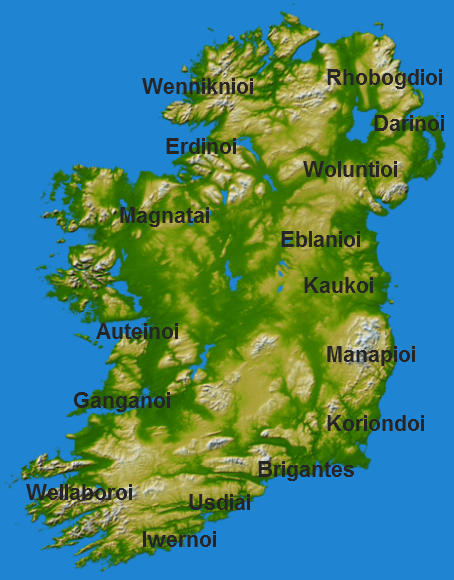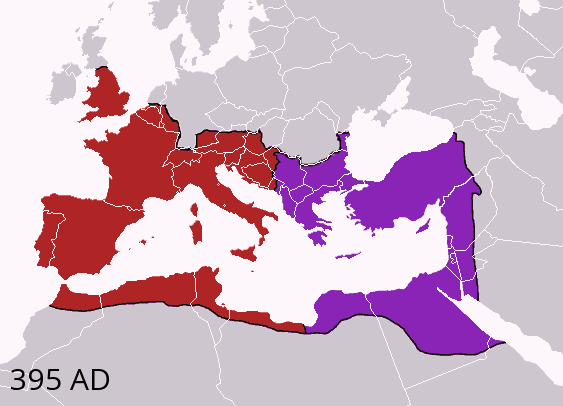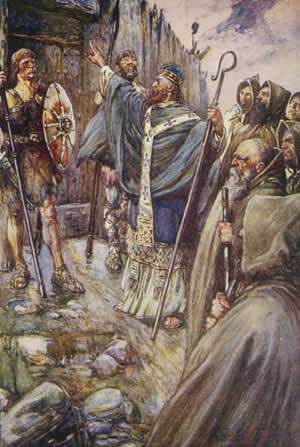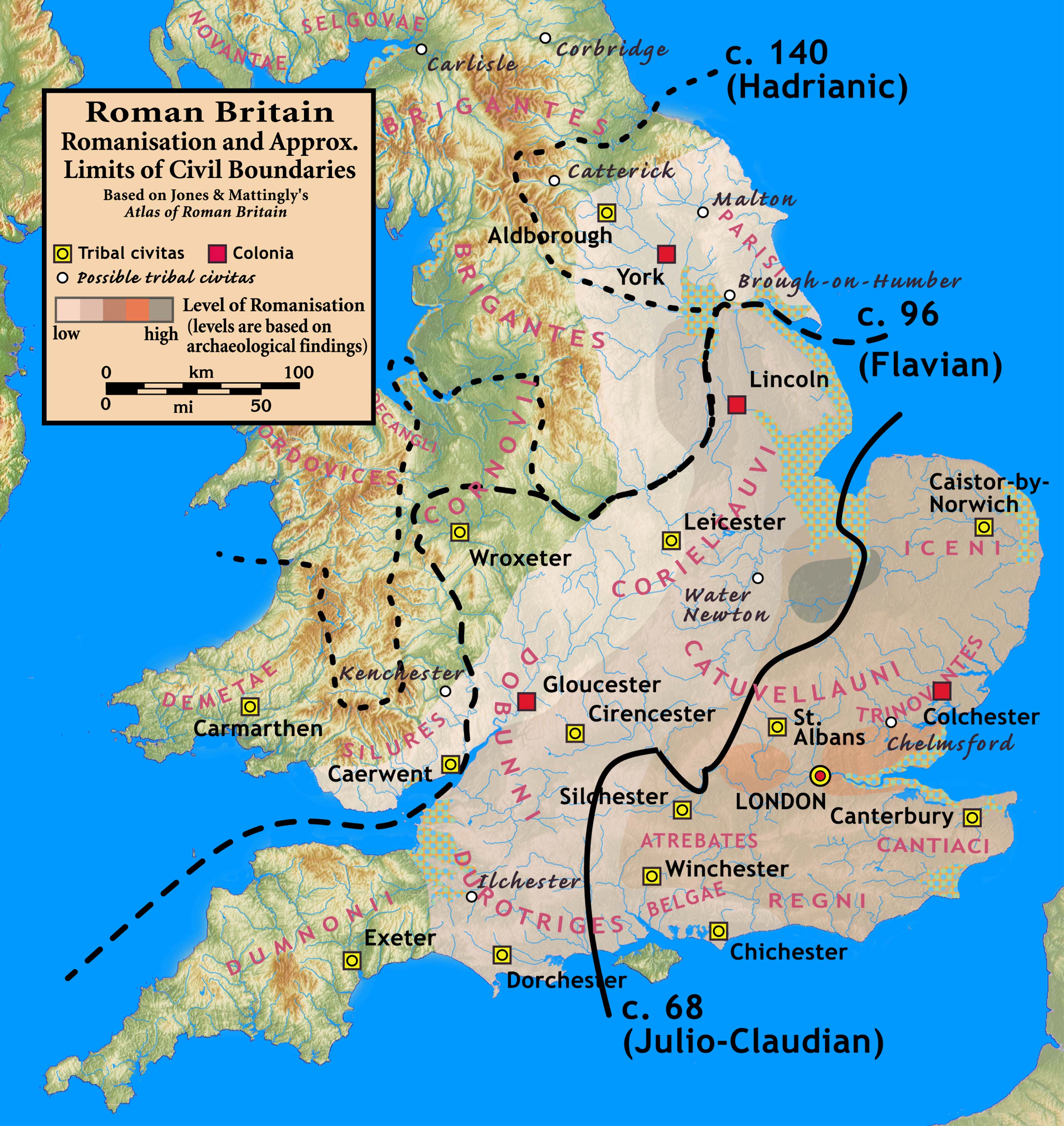|
Brythons
The Britons (Linguistic reconstruction, *''Pritanī'', la, Britanni), also known as Celtic Britons or Ancient Britons, were people of Celtic language and culture who inhabited Great Britain from at least the British Iron Age and into the Middle Ages, at which point they diverged into the Welsh people, Welsh, Cornish people, Cornish and Bretons (among others). They spoke the Common Brittonic language, the ancestor of the modern Brittonic languages. The earliest written evidence for the Britons is from Greco-Roman world, Greco-Roman writers and dates to the Iron Age.Koch, pp. 291–292. Celtic Britain was made up of many tribes and kingdoms, associated with various Hillforts in Britain, hillforts. The Britons followed an Ancient Celtic religion overseen by druids. Some of the southern tribes had strong links with mainland Europe, especially Gaul and Belgica, and Celtic currency of Britain, minted their own coins. The Roman Empire Roman conquest of Britain, conquered most of Brit ... [...More Info...] [...Related Items...] OR: [Wikipedia] [Google] [Baidu] |
Bretons
The Bretons (; br, Bretoned or ''Vretoned,'' ) are a Celtic ethnic group native to Brittany. They trace much of their heritage to groups of Brittonic speakers who emigrated from southwestern Great Britain, particularly Cornwall and Devon, mostly during the Anglo-Saxon settlement of Britain. They migrated in waves from the 3rd to 9th century (most heavily from 450 to 600) into Armorica, which was subsequently named Brittany after them. The main traditional language of Brittany is Breton (''Brezhoneg''), spoken in Lower Brittany (i.e., the western part of the peninsula). Breton is spoken by around 206,000 people as of 2013. The other principal minority language of Brittany is Gallo; Gallo is spoken only in Upper Brittany, where Breton is less dominant. As one of the Brittonic languages, Breton is related closely to Cornish and more distantly to Welsh, while the Gallo language is one of the Romance '' langues d'oïl''. Currently, most Bretons' native language is standard ... [...More Info...] [...Related Items...] OR: [Wikipedia] [Google] [Baidu] |
Gaels
The Gaels ( ; ga, Na Gaeil ; gd, Na Gàidheil ; gv, Ny Gaeil ) are an ethnolinguistic group native to Ireland, Scotland and the Isle of Man in the British Isles. They are associated with the Gaelic languages: a branch of the Celtic languages comprising Irish, Manx and Scottish Gaelic. Gaelic language and culture originated in Ireland, extending to Dál Riata in western Scotland. In antiquity, the Gaels traded with the Roman Empire and also raided Roman Britain. In the Middle Ages, Gaelic culture became dominant throughout the rest of Scotland and the Isle of Man. There was also some Gaelic settlement in Wales, as well as cultural influence through Celtic Christianity. In the Viking Age, small numbers of Vikings raided and settled in Gaelic lands, becoming the Norse-Gaels. In the 9th century, Dál Riata and Pictland merged to form the Gaelic Kingdom of Alba. Meanwhile, Gaelic Ireland was made up of several kingdoms, with a High King often claiming lordsh ... [...More Info...] [...Related Items...] OR: [Wikipedia] [Google] [Baidu] |
Brittonic Languages
The Brittonic languages (also Brythonic or British Celtic; cy, ieithoedd Brythonaidd/Prydeinig; kw, yethow brythonek/predennek; br, yezhoù predenek) form one of the two branches of the Insular Celtic languages, Insular Celtic language family; the other is Goidelic languages, Goidelic. The name ''Brythonic'' was derived by Wales, Welsh Celtic studies, Celticist John Rhys from the Welsh language, Welsh word , meaning Ancient Britons as opposed to an Anglo-Saxons, Anglo-Saxon or Gaels, Gael. The Brittonic languages derive from the Common Brittonic language, spoken throughout Great Britain during the British Iron Age, Iron Age and Roman Britain, Roman period. In the 5th and 6th centuries emigrating Britons also took Brittonic speech to the continent, most significantly in Brittany and Britonia. During the next few centuries the language began to split into several dialects, eventually evolving into Welsh language, Welsh, Cornish language, Cornish, Breton language, Breton, Cumbri ... [...More Info...] [...Related Items...] OR: [Wikipedia] [Google] [Baidu] |
Roman Empire
The Roman Empire ( la, Imperium Romanum ; grc-gre, Βασιλεία τῶν Ῥωμαίων, Basileía tôn Rhōmaíōn) was the post- Republican period of ancient Rome. As a polity, it included large territorial holdings around the Mediterranean Sea in Europe, North Africa, and Western Asia, and was ruled by emperors. From the accession of Caesar Augustus as the first Roman emperor to the military anarchy of the 3rd century, it was a Principate with Italia as the metropole of its provinces and the city of Rome as its sole capital. The Empire was later ruled by multiple emperors who shared control over the Western Roman Empire and the Eastern Roman Empire. The city of Rome remained the nominal capital of both parts until AD 476 when the imperial insignia were sent to Constantinople following the capture of the Western capital of Ravenna by the Germanic barbarians. The adoption of Christianity as the state church of the Roman Empire in AD 380 and the fall of th ... [...More Info...] [...Related Items...] OR: [Wikipedia] [Google] [Baidu] |
Anglo-Saxons
The Anglo-Saxons were a cultural group who inhabited England in the Early Middle Ages. They traced their origins to settlers who came to Britain from mainland Europe in the 5th century. However, the ethnogenesis of the Anglo-Saxons happened within Britain, and the identity was not merely imported. Anglo-Saxon identity arose from interaction between incoming groups from several Germanic tribes, both amongst themselves, and with indigenous Britons. Many of the natives, over time, adopted Anglo-Saxon culture and language and were assimilated. The Anglo-Saxons established the concept, and the Kingdom, of England, and though the modern English language owes somewhat less than 26% of its words to their language, this includes the vast majority of words used in everyday speech. Historically, the Anglo-Saxon period denotes the period in Britain between about 450 and 1066, after their initial settlement and up until the Norman Conquest. Higham, Nicholas J., and Martin J. Ryan. ''The An ... [...More Info...] [...Related Items...] OR: [Wikipedia] [Google] [Baidu] |
Anglo-Saxon Settlement Of Britain
The Anglo-Saxon settlement of Britain is the process which changed the language and culture of most of what became England from Romano-British to Germanic. The Germanic-speakers in Britain, themselves of diverse origins, eventually developed a common cultural identity as Anglo-Saxons. This process principally occurred from the mid-fifth to early seventh centuries, following the end of Roman rule in Britain around the year 410. The settlement was followed by the establishment of the Heptarchy, Anglo-Saxon kingdoms in the south and east of Britain, later followed by the rest of modern England, and the south-east of modern Scotland. The available evidence includes the scant contemporary and near-contemporary written record, archaeological and genetic information. The few literary sources tell of hostility between incomers and natives. They describe violence, destruction, massacre, and the flight of the Romano-British population. Moreover, little clear evidence exists for an ... [...More Info...] [...Related Items...] OR: [Wikipedia] [Google] [Baidu] |
End Of Roman Rule In Britain
The end of Roman rule in Britain was the transition from Roman Britain to Sub-Roman Britain, post-Roman Britain. Roman rule ended in different parts of Britain at different times, and under different circumstances. In 383, the usurper Magnus Maximus withdrew troops from northern and western Britain, probably leaving local warlords in charge. Around 410, the Romano-British expelled the magistrates of the usurper Constantine III (Western Roman Emperor), Constantine III. He had previously stripped the Roman garrison from Britain and taken it to Gaul in response to the Crossing of the Rhine in late 406, leaving the island a victim to barbarian attacks. Roman Emperor Honorius (emperor), Honorius replied to a request for assistance with the ''Rescript of Honorius'', telling the Romano-British culture, Roman cities to see to their own defence, a tacit acceptance of temporary British self-government. Honorius was fighting a large-scale war in Roman Italy, Italy against the Visigoths un ... [...More Info...] [...Related Items...] OR: [Wikipedia] [Google] [Baidu] |
Pictish Language
Pictish is the extinct Brittonic language spoken by the Picts, the people of eastern and northern Scotland from Late Antiquity to the Early Middle Ages. Virtually no direct attestations of Pictish remain, short of a limited number of geographical and personal names found on monuments and the contemporary records in the area controlled by the kingdoms of the Picts, dating to the early medieval period. Such evidence, however, points strongly to the language being an Insular Celtic language related to the Brittonic language spoken prior to Anglo-Saxon settlement in what is now southern Scotland, England, and Wales. The prevailing view in the second half of the 20th century was that Pictish was a non-Indo-European language isolate, predating a Gaelic colonisation of Scotland or that a non-Indo-European Pictish and Brittonic Pictish language coexisted. Pictish was replaced by – or subsumed into – Middle Irish, Gaelic in the latter centuries of the Pictish period. During the ... [...More Info...] [...Related Items...] OR: [Wikipedia] [Google] [Baidu] |
Picts
The Picts were a group of peoples who lived in what is now northern and eastern Scotland (north of the Firth of Forth) during Late Antiquity and the Early Middle Ages. Where they lived and what their culture was like can be inferred from early medieval texts and Pictish stones. Their Latin name, , appears in written records from the 3rd to the 10th century. Early medieval sources report the existence of a distinct Pictish language, which today is believed to have been an Insular Celtic language, closely related to the Brittonic spoken by the Britons who lived to the south. Picts are assumed to have been the descendants of the Caledonii and other Iron Age tribes that were mentioned by Roman historians or on the world map of Ptolemy. The Pictish kingdom, often called Pictland in modern sources, achieved a large degree of political unity in the late 7th and early 8th centuries through the expanding kingdom of Fortriu, the Iron Age Verturiones. By the year 900, the result ... [...More Info...] [...Related Items...] OR: [Wikipedia] [Google] [Baidu] |
British Latin
British Latin or British Vulgar Latin was the Vulgar Latin spoken in Great Britain in the Roman and sub-Roman periods. While Britain formed part of the Roman Empire, Latin became the principal language of the elite, especially in the more romanized south and east of the island. However, in the less romanized north and west it never substantially replaced the Brittonic language of the indigenous Britons. In recent years, scholars have debated the extent to which British Latin was distinguishable from its continental counterparts, which developed into the Romance languages. After the end of Roman rule, Latin was displaced as a spoken language by Old English in most of what became England during the Anglo-Saxon settlement of the fifth and sixth centuries. It survived in the remaining Celtic regions of western Britain but died out in those regions too by about 700, when it was replaced by the local Brittonic languages. Background At the inception of Roman rule in AD 43 ... [...More Info...] [...Related Items...] OR: [Wikipedia] [Google] [Baidu] |
Romano-British Culture
The Romano-British culture arose in Britain under the Roman Empire following the Roman conquest in AD 43 and the creation of the province of Britannia. It arose as a fusion of the imported Roman culture with that of the indigenous Britons, a people of Celtic language and custom. Scholars such as Christopher Snyder believe that during the 5th and 6th centuries – approximately from 410 when the Roman legions withdrew, to 597 when St Augustine of Canterbury arrived – southern Britain preserved an active sub-Roman culture that survived the attacks from the Anglo-Saxons and even used a vernacular Latin when writing. Arrival of the Romans Roman troops, mainly from nearby provinces, invaded in AD 43, in what is now part of England, during the reign of Emperor Claudius. Over the next few years the province of Britannia was formed, eventually including the whole of what later became England and Wales and parts of Scotland.Kinder, H. & Hilgemann W. ''The Penguin Atlas of Wor ... [...More Info...] [...Related Items...] OR: [Wikipedia] [Google] [Baidu] |
Hadrian's Wall
Hadrian's Wall ( la, Vallum Aelium), also known as the Roman Wall, Picts' Wall, or ''Vallum Hadriani'' in Latin, is a former defensive fortification of the Roman province of Britannia, begun in AD 122 in the reign of the Emperor Hadrian. Running from Wallsend on the River Tyne in the east to Bowness-on-Solway in the west of what is now northern England, it was a stone wall with large ditches in front of it and behind it that crossed the whole width of the island. Soldiers were garrisoned along the line of the wall in large forts, smaller milecastles and intervening turrets. In addition to the wall's defensive military role, its gates may have been customs posts. A significant portion of the wall still stands and can be followed on foot along the adjoining Hadrian's Wall Path. The largest Roman archaeological feature in Britain, it runs a total of in northern England. Regarded as a British cultural icon, Hadrian's Wall is one of Britain's major ancient tourist attra ... [...More Info...] [...Related Items...] OR: [Wikipedia] [Google] [Baidu] |










.jpg)
